
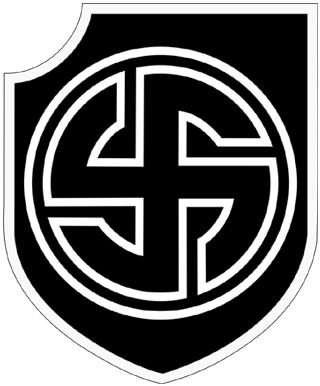

Interview with Svend Larsen who served in SS-Panzergrenadier-Regiment 24 'Danmark' (Nordland).
Larsen also volunteered in the Finnish Winter War 1939-40 and was a member of the DNSAP (Danish National Socialist Workers' Party - member # 40103). Sonderborg, Denmark, 1988.
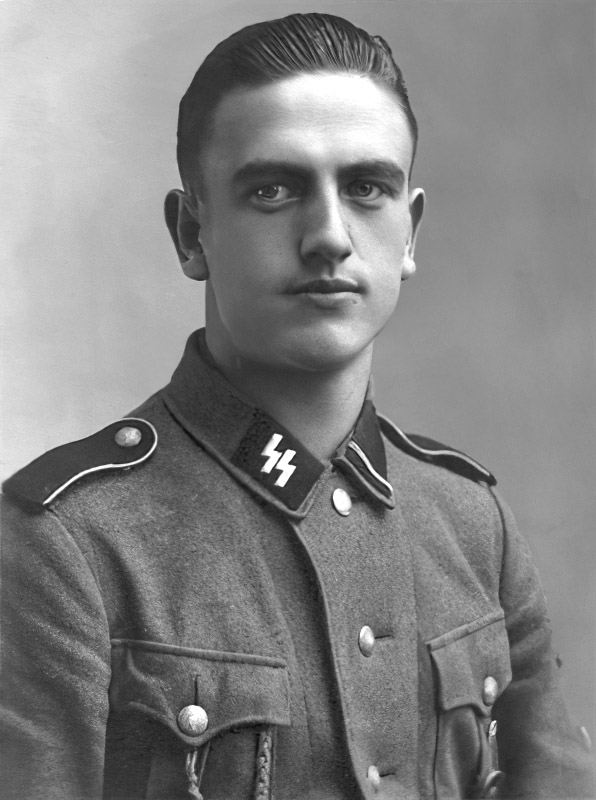
[Above: Svend Larsen (October 9, 1921 - March 22, 2009).]

[Above: Waffen-SS 'Danmark' cuff title.]
Thanks for meeting me, I would like to ask you first off, what brought you to join the Germans, and particularly the SS?
Svend: That question has many answers, and 40 years after it is hard to explain. I must go to the beginning. When Hitler brought the NSDAP to prominence, copies sprang up in every nation. This seemed like the political party that had the answers to end the problems of the day.
In Denmark we had the DNSAP which had a very large following; it was very anti-communist and yet still sided with the worker. There was a need to both help those who created jobs, and to protect those who worked for them. It was a new concept but was gaining popularity.
We had a King that was more of a symbol, a liberal government, and communist agitators. The DNSAP was faced with attacks, vandalism, and censorship. This made many people shy away and hide their heads in the sand. They did not want to be attacked for supporting what the communists called 'anti-human rights people'. This is why fighting sometimes broke out, until the Germans came.
I must dispel something to you as well, today they say Germany attacked and invaded Denmark. I will tell you that this is not true. Britain had plans to occupy Norway in 1940, and Germany feared they may invade Denmark too. Denmark did have a good relationship with Germany, so the Germans asked if they could occupy to deter Britain.
The King and government said yes, per existing treaties, and allowed German units to come in. Of course some came in too soon and a few Danish forces fought them, but for the most part it was a peaceful affair. The Germans released all military and police they disarmed, and then rearmed them again to help keep life as it was.
I had no quarrel with the Germans, they were hardly seen, and life went on as normal. The DNSAP had more power and now helped run the nation. I saw more propaganda, which was interesting as it spoke in a racial tone in fighting what they called Jewish Communism; I was very anti-communist and I wanted to read more.
This set me on the course to understand a big fight was coming; Russia already occupied large areas not too far away, and had the end goals of taking over the world. They said that even in their own propaganda, they were not afraid to say they wanted every nation under the hammer and sickle.
From what we had read in school and the papers, they had killed many millions to achieve their 'utopia' in Russia; we wanted nothing to do with that here. I was convinced that the only real threat to communism was Hitler's National Socialism, so I leaned more to this idea.
When Germany and her allies attacked Russia, I knew the time had come for me to act. The DNSAP had sent out a request for men to come to a new legion being formed in Denmark, the Free Corps Denmark. I went to ask about terms, and was very pleased. It was all volunteer, and part of the Germanic SS which paid very well.
While I did not join to fight for Hitler or Germany, as it may seem, I did join the Germans as they were the only ones who seemed willing to face a threat we all knew was getting bigger. We were allowed to wear and display our nation's flag, speak our language, and keep our traditions.
How did your families and the Danish people view the men who joined the Germans?
Svend: As I said, many Danes hated communism, and while they may not have agreed with some ideas of Hitler regarding Jews or such, they understood a big threat was in the east. We did have a very active communist movement in Denmark that went underground in 1940; they always spread leaflets critical of the Germans and the DNSAP. When caught, they were sent to jail or had to pay heavy fines.
They were somewhat effective however, as they would launch attacks on the homes of DNSAP members and those who worked with the Germans. Two comrades were attacked and beaten by a communist gang while out at the movies. They had pistols and were able to defend themselves, but it shows the commies were active. They did things like this as they knew it would result in free press, and sometimes harsher laws.
Some families did oppose their sons joining, but when you are idealistic you do not listen to parents. We felt most of the nation was with us and understood our reasons for joining. We did not let the small minority who opposed us deter this decision.
There was great fanfare when we marched off, some never to come back again. We marched away believing we were in a new crusade, this time against godless communism. We were in a sense saving our people and they did not fully know it.
Of course we had many, many supporters who greeted us, and looked after us. The average person did not understand it all, and for that we had no judgment. Only the communists and their sympathizers caused any problems.
Of course when the war ended then everyone was against us, and always had been, so they claimed. A wave of resentment swept over the country that is still felt today. I do not fully understand it, it is clear we fought on the right side that was trying to defeat communism.
How many people would still be alive today if we had won? After the war they helped or were directly responsible for killing millions in the east, and even their own who helped us. I just do not understand how people can be so mislead, to believe fighting the worst evil Europe has seen was somehow wrong. One of the best tricks the communists did was getting themselves into high positions under the guise of patriots. Now they get to tell the story as they see fit.
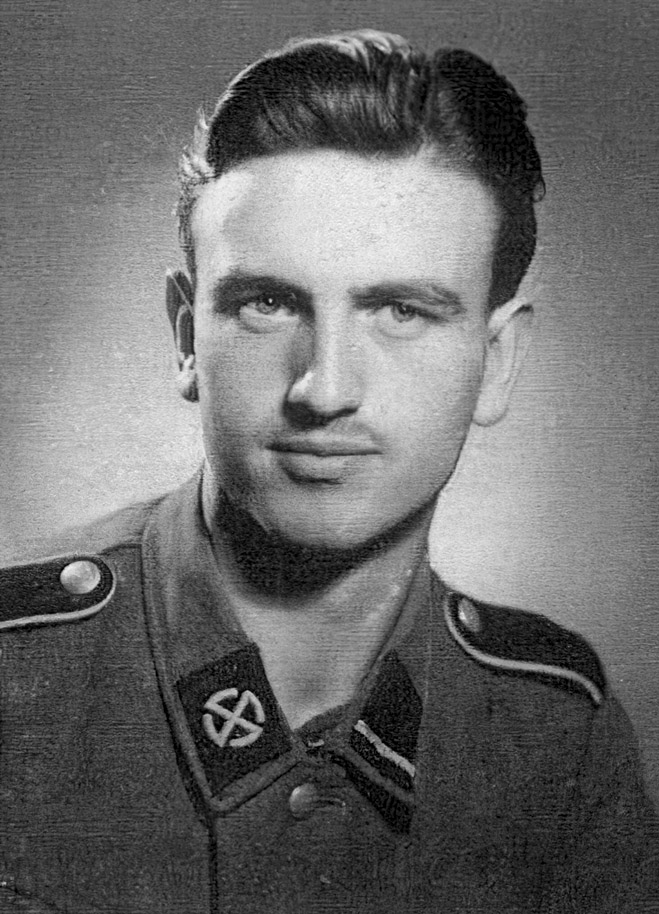
[Above: Svend Larsen.]
How did the Germans treat you during training, did you feel like they looked down on you?
Svend: Heavens no, they were comrades and very glad to have us on their side. It was awkward for some as they were the occupiers of some of the nations who came to them, and were careful to not be seen as the victors. I would say they treated us very well, the only problems we had were language barriers, and we had German classes that helped.
Many of us went into combat still speaking a mix of German and Danish.
When we boarded trains to take us to Germany, many Danish speaking Germans were assigned to look after us. One soldier was yelled at, as we had some Danish girls leaving to train with the Red Cross and he was trying to flirt. Many of us spent the time talking to some of the Germans who had already been in combat. We were trying to get a feel for what it would be like.
When we crossed the border German youths were seen with signs that said "Germany greets our Danish brothers". We waved to them and it lifted the spirit to see so many welcome us. At the station we were given food and drinks by the girls of the BDM [Bund Deutscher Mädel, or League of German Girls]. Some ran up and gave kisses to us, which made us blush, but we liked it.
We were sent to the barracks at Langenhorn [Schleswig-Holstein] for basic training, then to Treskau [Poland] for specialized training. Our first week at barracks was mostly spent talking in classes about why we were here and what it means. These were political classes mixed with German classes.
These were boring and hard to stay awake in, as they began very early. Many of our ranks were former Danish military, so politics is not something that interests a soldier. We appreciated they wanted to make us feel welcomed and all, but we were ready to get moving. We could tell the people who conducted these classes really believed in what they were doing, and became angry if no one asked questions. [Hahaha! This is so funny!-Ed.]
The training regimen was much like any army, up early, exercise, clean, eat, class, march, eat, drill, eat, some free time, and then bed. Our instructors were more like college lecturers than raving drill instructors. Some could be seen yelling, but in the SS it was frowned on. We felt more like we were in a fraternity of serious men, who had much fun.
One day during inspection, it was wet out and my rifle was splashed with mud by the man in front of me while marching. I spit on my hand and rubbed it off, careful to not touch my uniform. The NCO noticed this and asked where the mud came from, I explained my quandary: if I wiped it off, my uniform would be dirty and I would fail, if I left it on I would fail. The best solution was to put it on my hand and keep it away from what could get dirty. He bellowed out to all the men, that it is thinking like this that saves lives, you learn you live.
I was relieved, as I thought I would have to run or do extra cleaning duties. Once this basic training was complete we were sent to Treskau which is now part of Poland. There was a camp nearby I remember, and the prisoners were free to work special details with no guards. They would be seen cleaning the grounds of the barracks or working in the fields nearby. I say this to you as I saw no abuse that was evident.
You fought on the Russian front, what was that like for you and how did you see the Russian soldier?
Svend: Russia was vast, wet, and cold. We ended up in the north sector as did most northern volunteers, I guess we were used to the weather. The Free Corps was not fully ready for combat, but we received orders to go to Demjansk [northern Russia]. A Russian counterattack in December had pushed the Germans back and encircled many units.
We were confused at what happened; we were filled with thoughts of a quick victory over Russia, the Germans said they were on their last leg. They attacked the central and north sectors driving the Germans back pretty far. We were flown into an encircled Demjansk via JU 52 transports. Ivan put up a storm of flak which did little damage.
We only had light weapons, and Ivan hit us with tanks, artillery, and aircraft. Some men were disillusioned at first but we had very good inspirational leaders who took control and led by example. Schalburg [Christian Frederik von Schalburg (April 15, 1906 – June 2, 1942)] was the main one; he was an inspiration to us all. He led us in an attack against a bridgehead which was our first real action. He fell due to a mine and artillery fire when we had to retake the position again. It was a big loss for the corps.
We had many men who had fought the Russians in the Winter War and knew them well. I found the Russian soldier to be fierce and willing to die for his cause. We had to fight their attacks often hand-to-hand, they charged us like wild bears. I still remember seeing the blue in their eyes, and thinking how is it we are enemies? Then the thought of what the world would be like if their political agenda won hit me.
We learned to respect the Russian soldier, but also to hate the ideology that they fought for. I am hearing more and more of the war crimes they committed during and after the war. We would never surrender to them as it meant certain death. Russian civilians told us that they saw the men with flags on their uniforms being shot by NKVD [People's Commissariat for Internal Affairs] men.
Our men reported seeing wounded men shot after capture, the communists looked upon us as fanatical fascists who could not be helped. If we saw the NKVD they were our first targets, and we would not have taken them prisoner. We had no hate towards the common combat soldier, indeed we respected them.
We got on well with some of the prisoners we took, some even asked to stay to help us as they hated the regime of Stalin. I cannot view them all as bad, and I never did. I remember those Russians who willingly allowed us use of their wells and huts during our stays in their villages.
Do not believe what the government has said about how they were treated. If you read what the communists say today it is sickening, and it got a lot of innocent men killed. We were far from home in a vast country in which we had to survive, harming the people would have done nothing for us, only create enemies.
The weather alone was our enemy, and keeping supplied was our enemy, we did not need the people rising up as well. The communists have made it seem like a heroic people's war, but it was not. Most people stayed safe and were respected by all our forces. Only the few partisans who waged an awful fight were all I saw in civilian clothes being engaged.
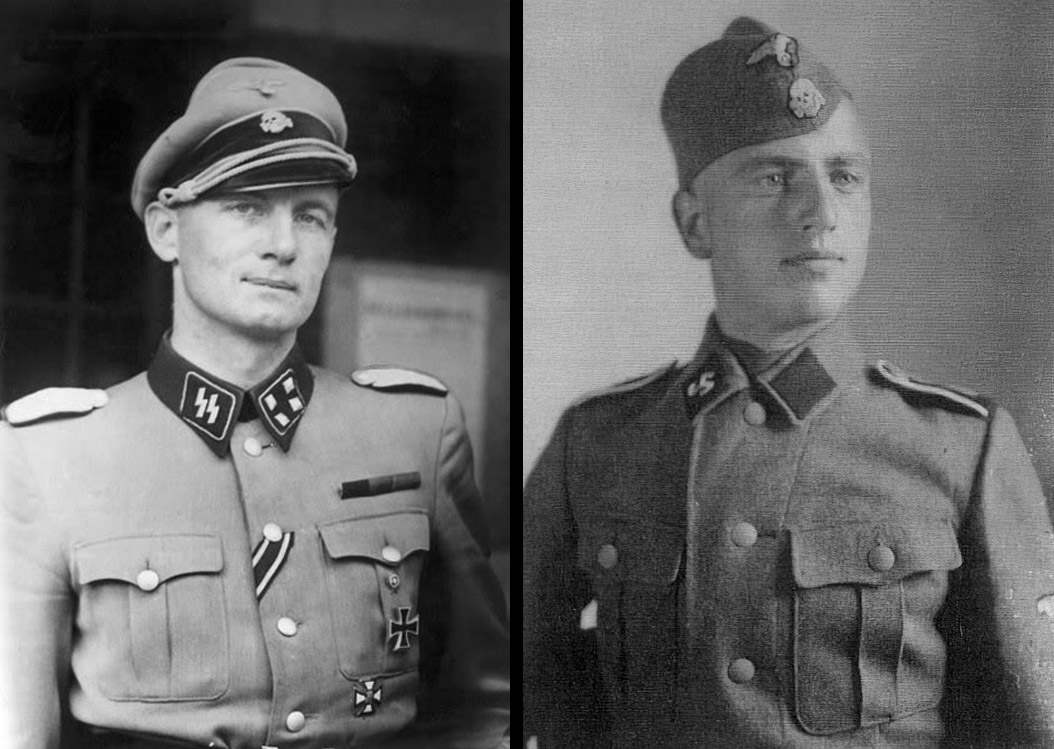
[Above: Christian Frederik von Schalburg (left) and Svend Larsen.]
Can I ask how you feel about the Waffen-SS being called a criminal organization that committed war crimes and killed countless civilians?
Svend: I do not like it and here is why: I saw a completely opposite side. Now I understand that bad things happen in war, and it is very possible a few bad apples made bad decisions. To label all of us as criminals, and tell fantastic stories about crimes is wrong. I believe most of the stories are just the creations of sick people who have an ax to grind and are settling old scores.
One writer here wrote not too long ago that he witnessed a German shoot a child simply for sticking her tongue out at him. This is absurd and would never have happened, yet how many believed this, since it came from a good writer?
I have read that even former members of the SS have stated they saw or took part in illegal killings. I can only explain these stories like this: After the war the Allies used every trick to make men confess to things they wanted them to confess to. They threatened death, or to harm the family and friends of the men if they did not sign confessions. I know this as many have stated it to me.
They forced us to watch their movies and look at pictures, even bringing in people who witnessed things to relay what they saw. It all seemed so convincing; there was trial after trial, which still goes on. Story upon story of killing, rape, torture, and abuse of innocent people was spread, and continues to be spread.
They parade these confessions as proof of blanket guilt, but do not be fooled. The men saying they saw these things are doing so out of a mental issue, greed for money, or they had an ax to grind against someone. As I say, some men may have lost it, and did a few of the things that are claimed, but I am sure it wasn't many.
The problem is you cannot tell which stories hold merit and which ones do not. If you believe them all, then we were just a bunch of evil blood thirsty men who, rather than fight the Russian soldier, were out killing civilians and Jews. There are stories of animal torture and killings by us, it is maddening. I do not read these stories anymore and ignore them.
The stories are hurtful, and it is the grandchildren of our generation who are being fed this filth, and forced to believe it. Can you imagine grandchildren who hate their grandfathers because of what they read in school? It is shameful.
We can not be seen as the plain combat soldiers we were, we had nothing to do with camps, executing partisans, or reprisals. The photos, confessions, and videos all have explanations that would show it is not what it looks like. People were shot in civilian clothes, but that does mean they were innocent. We had many crimes committed against us, but we do not get to bring this up.
I am very proud of my service time and I believe in the end we will be seen as the saviors of Europe we are. Many men died to defeat a regime that never made it to the west, and I hope never will. Communism is protected by the soft governments of today, and if they ever are too lax it will be bad for us all.
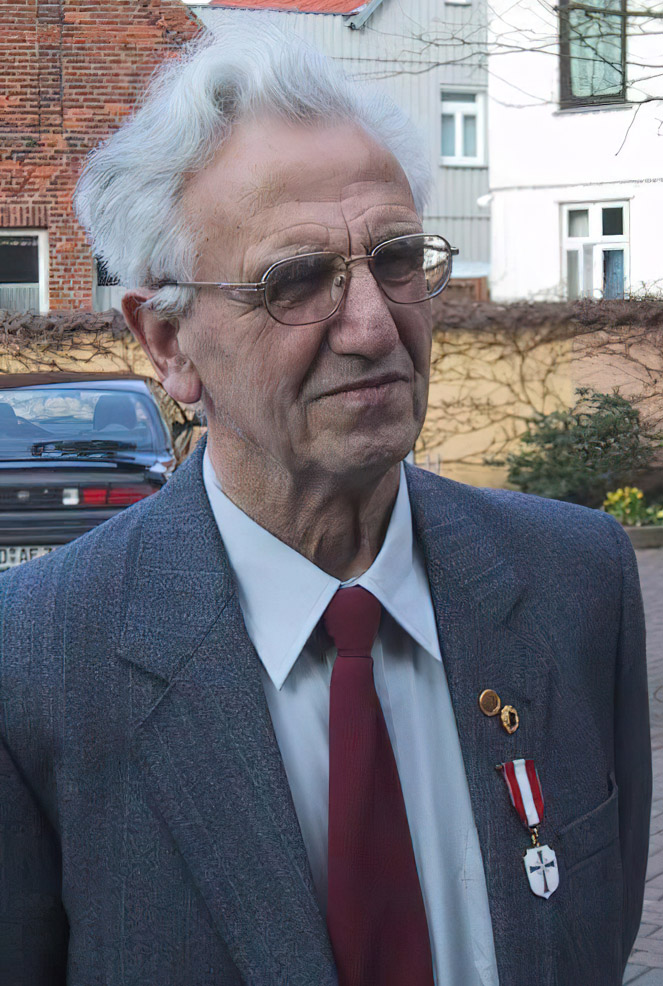
[Above: Svend Larsen, an old soldier, late in his years. He would die at the symbolic age of 88. He would never renounce his beliefs and would die defending his comrades and his heroic actions.]
Back to Interviews









